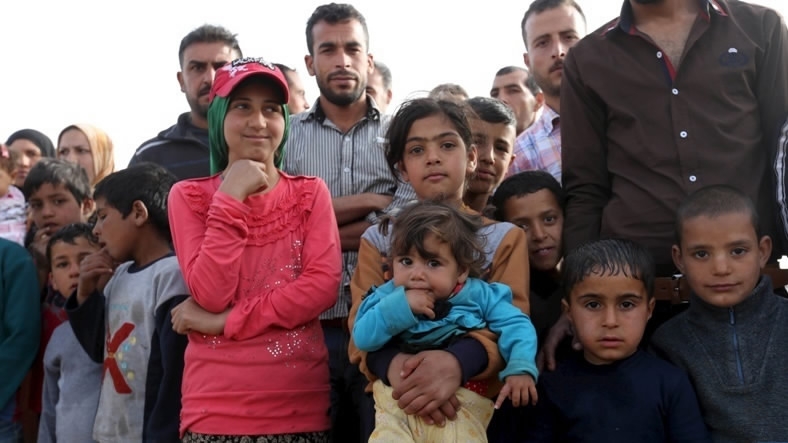The bloodshed in Syria has seen the indiscriminate deployment of a deadly cocktail of weaponry by all warring sides, from shoulder-fired missiles and mortar shells to booby traps, air-dropped cluster munitions and nerve agents. Now, the United Nations (UN) is highlighting a weapon of war of a different kind: Rape.
Civilians in the war-torn country have been subjected to "immense suffering" caused by sexual violence, UN investigators said in a report released on Thursday to mark the seventh anniversary of the Syrian war.
The macabre report, titled "I lost my dignity: Sexual and gender-based violence in the Syrian Arab Republic", chronicles cases of sexual intimidation, coercion and abuse on the Syrian territory which the UN Commission of Inquiry on Syria compiled between March 2011 – the beginning of anti-government demonstrations – through December 2017.
Investigators conducted 454 interviews with survivors, relatives of survivors, medical staff, defectors and lawyers, and detailed accounts and testimonies of sexual harassment and assault, including humiliating, degrading and torturous treatment.
Here are four takeaways from the gruesome 29-page
report:
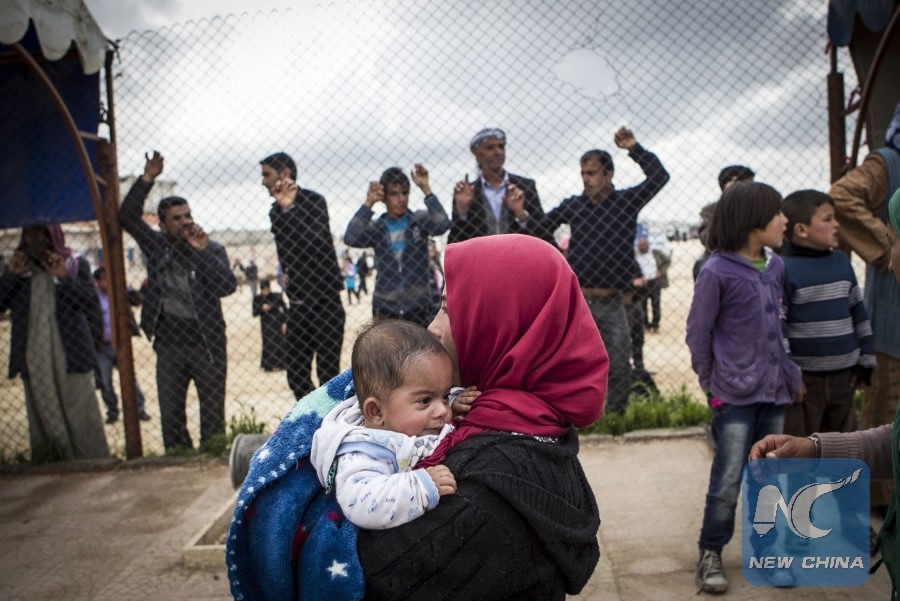
A Syrian Kurdish refugee and her child arrive in Kobane, Syria, April 3, 2015. /Xinhua Photo
A Syrian Kurdish refugee and her child arrive in Kobane, Syria, April 3, 2015. /Xinhua Photo
Across-the-board involvement
Members of virtually all fighting factions on the Syrian ground seem to have soiled their hands in sexual atrocities.
"Initial incidents of sexual and gender-based violence were carried out by government forces," the report said. But things were headed to a darker place as the country slipped into chaos.
The circle of perpetrators widened as the situation in Syria became more complex. Peaceful demonstrations gave way to a civil war, bringing a cohort of rival forces into existence. Armed militants vied for land control, and persecuted those who did not share their political or ideological stances.
Investigators pointed the finger of blame not only at Syrian soldiers, but also at pro-government forces, rebels, and terrorist groups, namely ISIL and Jabhat Fateh al-Sham, formerly known as al-Nusra Front.
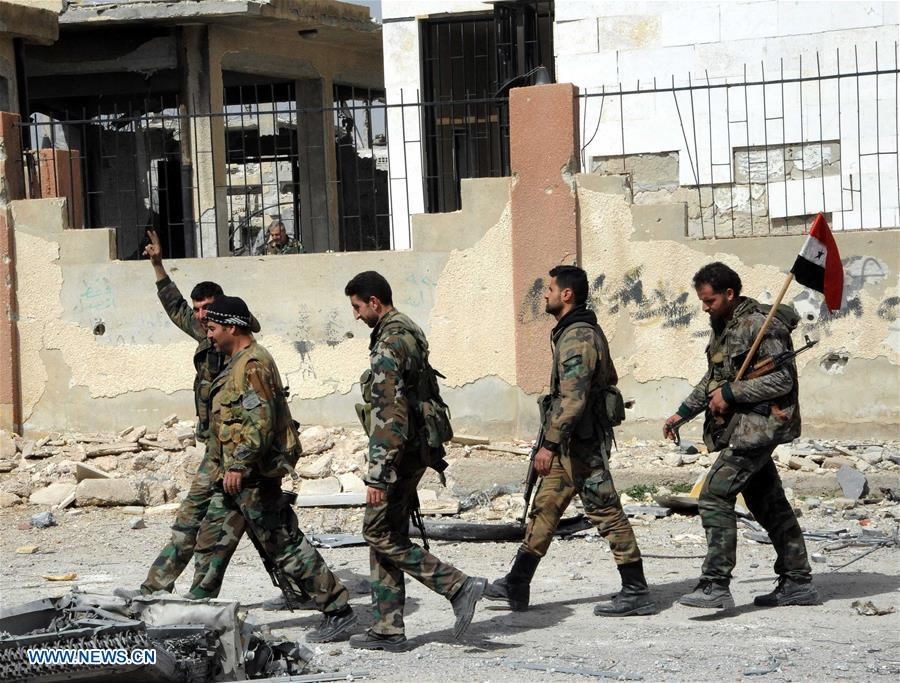
Syrian soldiers patrol in the recently liberated Nashabiyeh town in the rebel-held Eastern Ghouta region, Damascus, Syria, March 4, 2018. /Xinhua Photo
Syrian soldiers patrol in the recently liberated Nashabiyeh town in the rebel-held Eastern Ghouta region, Damascus, Syria, March 4, 2018. /Xinhua Photo
"It is utterly repugnant that brutal acts of sexual and gender-based violence continued to be perpetrated throughout Syria for seven years by most warring parties," Paulo Pinheiro, chairman of the Commission, told a panel event.
Disproportionate savagery
Not all sides of the Syrian conflict have gone to the same lengths in inflicting sexual abuse on civilians, the report found. Investigators accused the Syrian army and their armed backers of "systematic attack" against the civilian population, but claimed that similar crimes were "considerably less common" by rebel groups.
The document found that violations by government forces began during raids on houses of people suspected of joining protests against President Bashar al-Assad, with rape reportedly used as "punishment for rebellion and a way to deter opposition".
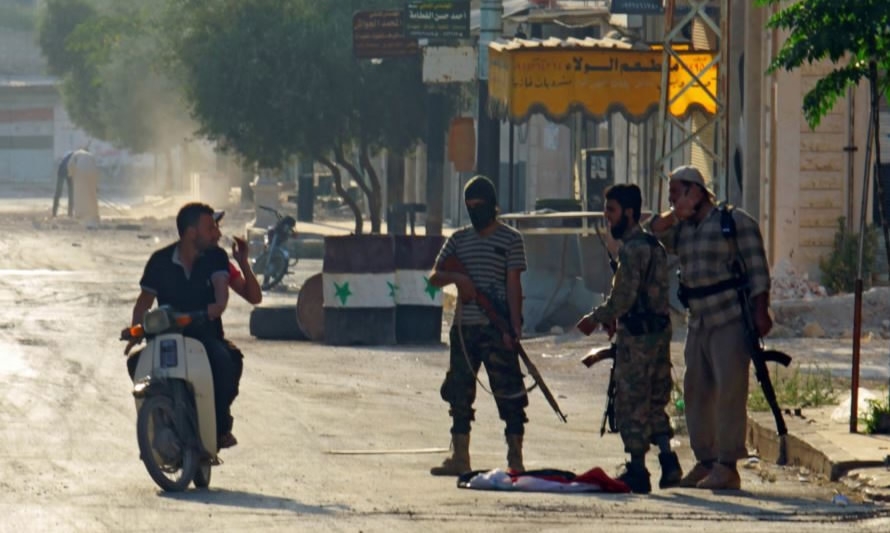
Rebel fighters from the jihadist group Jund al-Aqsa, later known as Liwa al-Aqsa, man a checkpoint in the town on Taybat al Imam, Syria, August 31, 2016. /Reuters
Rebel fighters from the jihadist group Jund al-Aqsa, later known as Liwa al-Aqsa, man a checkpoint in the town on Taybat al Imam, Syria, August 31, 2016. /Reuters
"Sexual violence [by soldiers and pro-government militias] mostly took the form of rapes, often gang-rapes by up to six perpetrators, that the families of victims, including their husbands and children, were forced to watch," the report read, with some women assaulted in public.
But as the landscape of the war morphed in Syria with the rise – and proliferation – of opposition groups, state troops turned to the skies, carrying out airstrikes against rebels. That limited their contact with civilians, and resulted in a shift in the form of sexual violence – which was now taking place at checkpoints and detention facilities, and involved invasive body searches.
Investigators concluded that the acts by Syrian soldiers and their allies amounted to war crimes and crimes against humanity, and recommended that the UN Security Council refer the results to the International Criminal Court for possible prosecutions.
Rebel groups also carried out similar measures but in different contexts involving "elements of exploitation, sectarianism, or revenge".
Men not immune to sexual violence
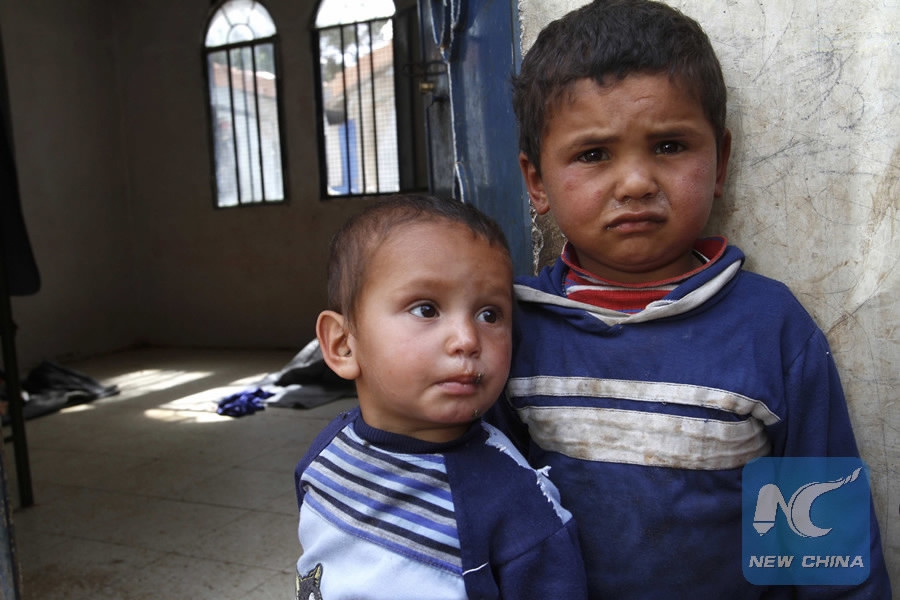
Syrian children are seen at a refugee camp in the southern Syrian province of Suweida, May 9, 2016. /Xinhua Photo
Syrian children are seen at a refugee camp in the southern Syrian province of Suweida, May 9, 2016. /Xinhua Photo
Women might have been "disproportionately affected" by the widespread sexual assault and harassment, but men were not safe either.
Genital mutilation, electrocution of genitals and rape with batons, bottles and pipes, are some of the abhorrent torture methods that men were subjected to during admission to detention facilities and interrogation. Putting them through sexual pain was also reportedly a way for prison guards to have gratuitous fun.
"It’s an exceedingly ugly crime. We know it’s awful for women, but it’s pretty bad for men as well," said Karen AbuZayd, member of the Commission, during the release of the report.
Children were also found to have been affected by sexual violence, with the youngest known victim being a nine-year-old girl, according to the UN inquiry. Investigators also found that boys as young as 11 endured sexually humiliating treatment behind bars, or were forced to watch their parents suffer in prison cells.
Lasting psychological damage
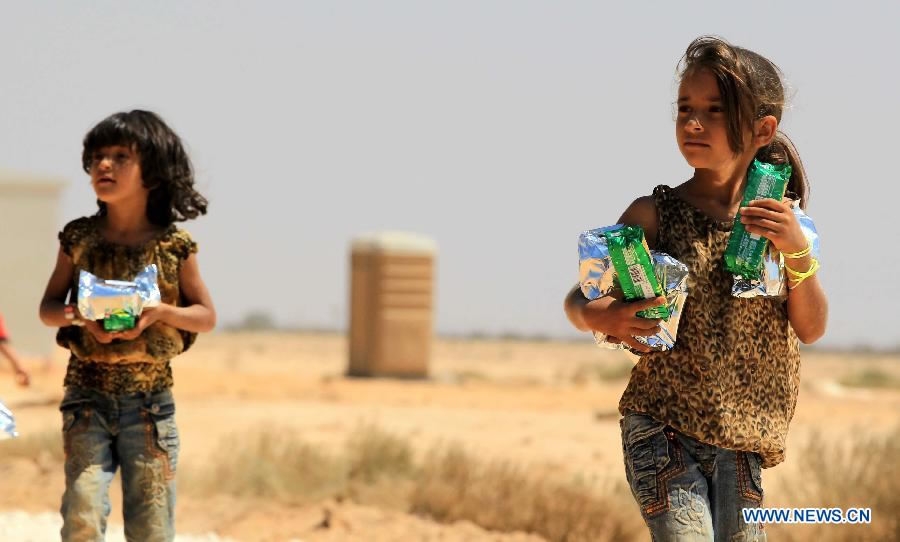
Two girls hold snacks in their hands. /Xinhua Photo
Two girls hold snacks in their hands. /Xinhua Photo
In a region where sex is largely a forbidden subject and honor still hinges on women’s conduct, coming out about sexual abuse or seeking social help is unthinkable, leaving victims in a whirlwind of pain and confusion, suffering in silence.
Feelings of shame, guilt, and hopelessness were recorded in survivors regardless of their gender, the investigators said, with some attempting suicide to escape the cruel reality. "Some interviewees consider that it is worse for a girl to be raped than to be killed," the inquiry stated, arguing that in certain cases female victims were held responsible for the lasting stigma and shame on their family.
Traditional notions of manhood, which emphasize power and domination, have also left male rape survivors with deep psychological scars, making them feel less manly.
"They were forced to have intercourse with one another and with other relatives. They tell you about losing their masculinity, becoming impotent," AbuZayd said.
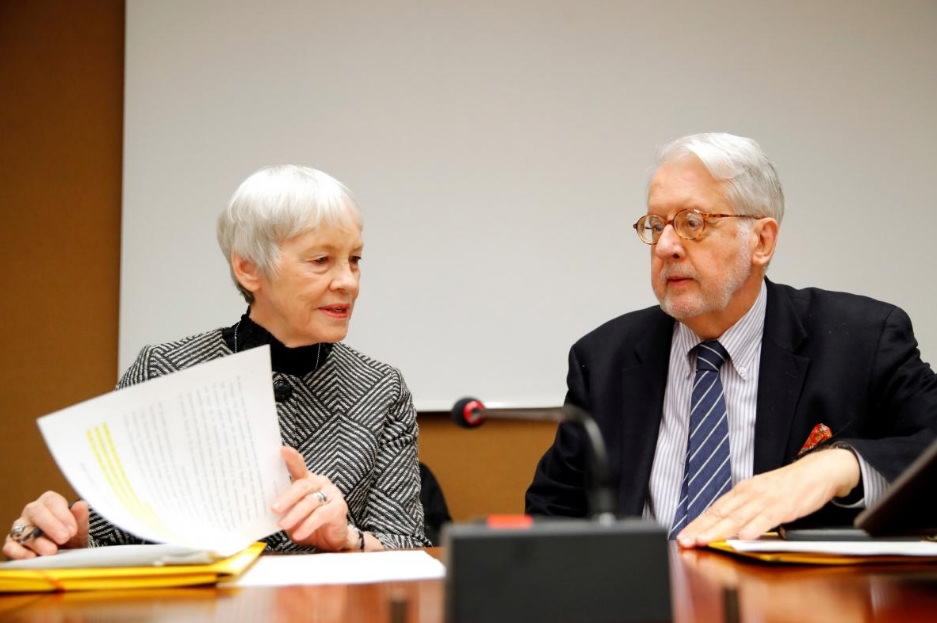
Paulo Pinheiro, Chairperson of the Commission of Inquiry on Syria (R), arrives with Karen AbuZayd, member of the Commission, before the launch of their report on sexual and gender-based violence in Syria at the United Nations office in Geneva, Switzerland, March 15, 2018. /Reuters Photo
Paulo Pinheiro, Chairperson of the Commission of Inquiry on Syria (R), arrives with Karen AbuZayd, member of the Commission, before the launch of their report on sexual and gender-based violence in Syria at the United Nations office in Geneva, Switzerland, March 15, 2018. /Reuters Photo
Rape and other forms of sexual assault are the latest in a growing list of sufferings that Syrians have been enduring amid the death and destruction that have engulfed the country.
The protracted conflict, now entering its eighth year, has claimed over 350,000 lives, according to a UK-based war monitor, and uprooted around half of the country’s 23 million pre-war population.
The vulnerability of the Syrian population has given rise to opportunistic and exploitative behaviors. Thursday’s report was the latest showcase of using sex as a weapon of manipulation and control.
Last month, a
controversial report by the United Nations Population Fund (UNFPA) showed that aid officials working for the UN and other international charities had been exchanging humanitarian assistance for sex for at least three years. Some cases involved workers urging women to share their telephone number or spend the night with them if they wanted to receive meals. Another UN
document published in December 2017 detailed sexual abuses
against men and boys in refugee camps, detention centers and on the streets of countries of
asylum.

